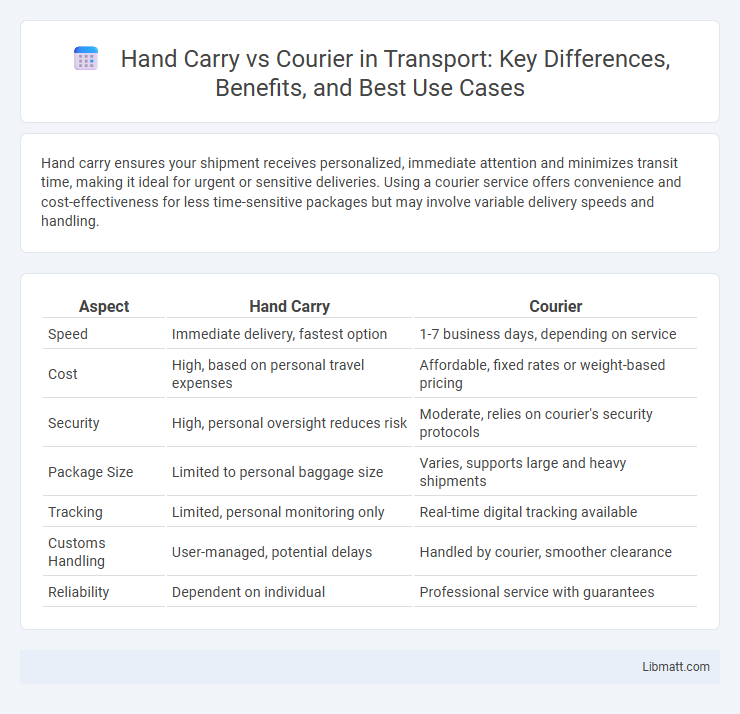Hand carry ensures your shipment receives personalized, immediate attention and minimizes transit time, making it ideal for urgent or sensitive deliveries. Using a courier service offers convenience and cost-effectiveness for less time-sensitive packages but may involve variable delivery speeds and handling.
Table of Comparison
| Aspect | Hand Carry | Courier |
|---|---|---|
| Speed | Immediate delivery, fastest option | 1-7 business days, depending on service |
| Cost | High, based on personal travel expenses | Affordable, fixed rates or weight-based pricing |
| Security | High, personal oversight reduces risk | Moderate, relies on courier's security protocols |
| Package Size | Limited to personal baggage size | Varies, supports large and heavy shipments |
| Tracking | Limited, personal monitoring only | Real-time digital tracking available |
| Customs Handling | User-managed, potential delays | Handled by courier, smoother clearance |
| Reliability | Dependent on individual | Professional service with guarantees |
Understanding Hand Carry and Courier Services
Hand carry services involve physically transporting your package or documents by a designated individual, offering direct control and expedited delivery, ideal for sensitive or urgent items. Courier services utilize professional delivery networks to handle shipments efficiently across various locations, providing tracking and logistical support. Choosing between hand carry and courier depends on the urgency, security, and distance of your shipment to ensure your delivery arrives safely and on time.
Key Differences Between Hand Carry and Courier
Hand carry involves physically transporting your package to its destination, ensuring faster delivery and direct oversight, while courier services rely on third-party logistics with scheduled pickups and drop-offs. Hand carry is ideal for urgent, valuable, or fragile items requiring immediate attention, whereas couriers offer a cost-effective solution for standard shipments with established tracking systems. Understanding these key differences helps you choose the best method based on urgency, security, and budget constraints.
Speed: Which Option Delivers Faster?
Hand carry services typically deliver parcels faster than couriers, especially for urgent or time-sensitive shipments within the same city or country. Couriers rely on scheduled routes and multiple stops, which can delay delivery times compared to the direct and immediate transport offered by hand carry. For international shipments, hand carry ensures priority handling, reducing transit time often associated with standard courier services.
Security and Safety Considerations
Hand carry methods offer enhanced security by allowing personal oversight of sensitive items, reducing the risk of theft or damage during transit. Couriers implement tracking systems and secure handling protocols, but the lack of continuous personal supervision increases potential exposure to mishandling or data breaches. Evaluating security and safety needs depends on the value and sensitivity of the shipment, with hand carry preferred for high-risk or confidential deliveries.
Cost Comparison: Hand Carry vs Courier
Hand carry services often involve higher immediate expenses due to personal delivery, including travel and accommodation costs, making them costlier for urgent, short-distance shipments. Courier services provide more affordable rates for standard deliveries, benefiting from bulk shipping discounts and established logistics networks that reduce overall expenses. Your choice depends on balancing speed and budget, with courier options typically offering better value for non-critical shipments.
Flexibility and Customization
Hand carry services offer unmatched flexibility and customization by allowing you to control pickup times, routes, and delivery speed according to urgent or specific needs. Unlike standard courier options that follow fixed schedules and predefined protocols, hand carry enables personalized handling and real-time adjustments to accommodate last-minute changes. This tailored approach ensures your shipments receive focused attention and adaptability for critical or sensitive deliveries.
Best Use Cases for Hand Carry
Hand carry is ideal for urgent, high-value, or fragile shipments that require direct personal delivery and real-time tracking. It suits small, critical items such as legal documents, prototypes, or medical supplies, ensuring security and immediate confirmation of receipt. This method minimizes transit time and reduces the risk of damage or loss compared to traditional courier services.
Best Use Cases for Courier Services
Courier services excel in delivering time-sensitive documents, high-value items, and packages requiring guaranteed tracking and security. You benefit from reliable, door-to-door delivery with proof of receipt, ideal for business contracts, legal papers, and urgent medical supplies. Their optimized logistics ensure swift and safe transport across local and international destinations, outperforming hand carry in efficiency and scalability.
Factors to Consider When Choosing
Choosing between hand carry and courier services depends on factors such as delivery speed, cost, and the nature of the items being shipped. Hand carry is ideal for urgent, high-value, or sensitive shipments requiring personal handling and immediate delivery, while courier services offer cost-effective options for less time-sensitive packages. Security, tracking capabilities, and delivery distance also influence the decision-making process for selecting the appropriate delivery method.
Conclusion: Choosing the Right Delivery Method
Hand carry ensures immediate and secure delivery for urgent or sensitive documents, ideal for time-critical situations requiring personal oversight. Courier services offer cost-effective, reliable shipping for less time-sensitive items with tracking and broader geographic coverage. Selecting between hand carry and courier depends on delivery speed, security needs, and budget constraints to optimize efficiency and control.
hand carry vs courier Infographic

 libmatt.com
libmatt.com